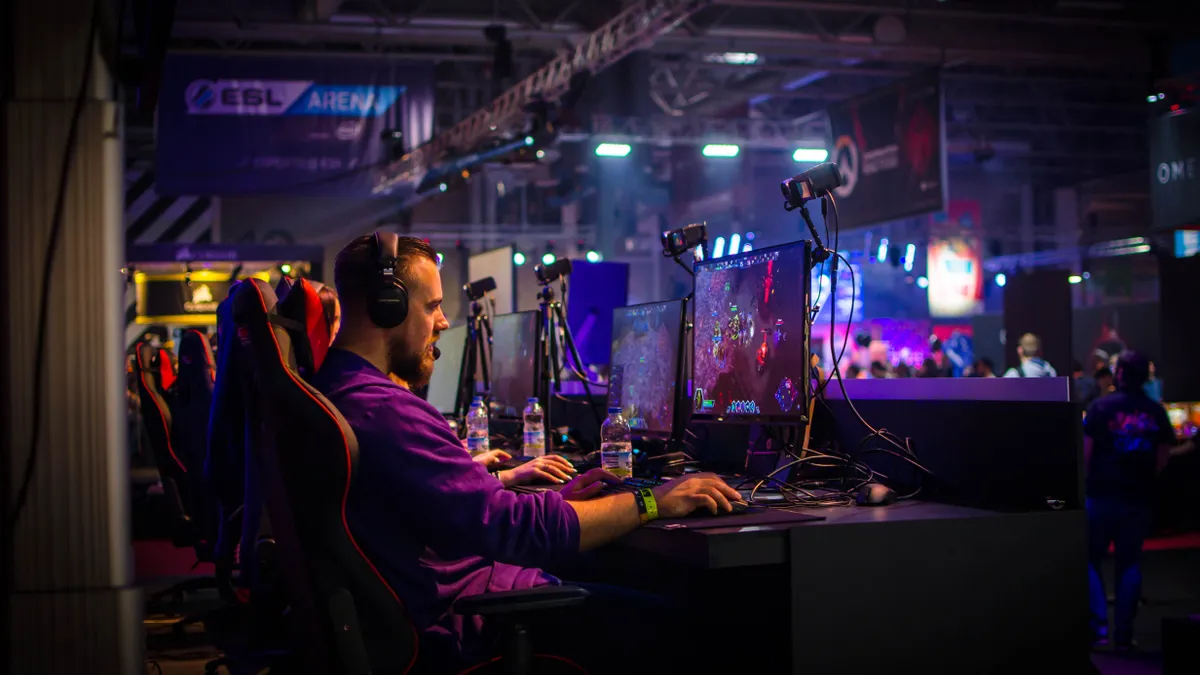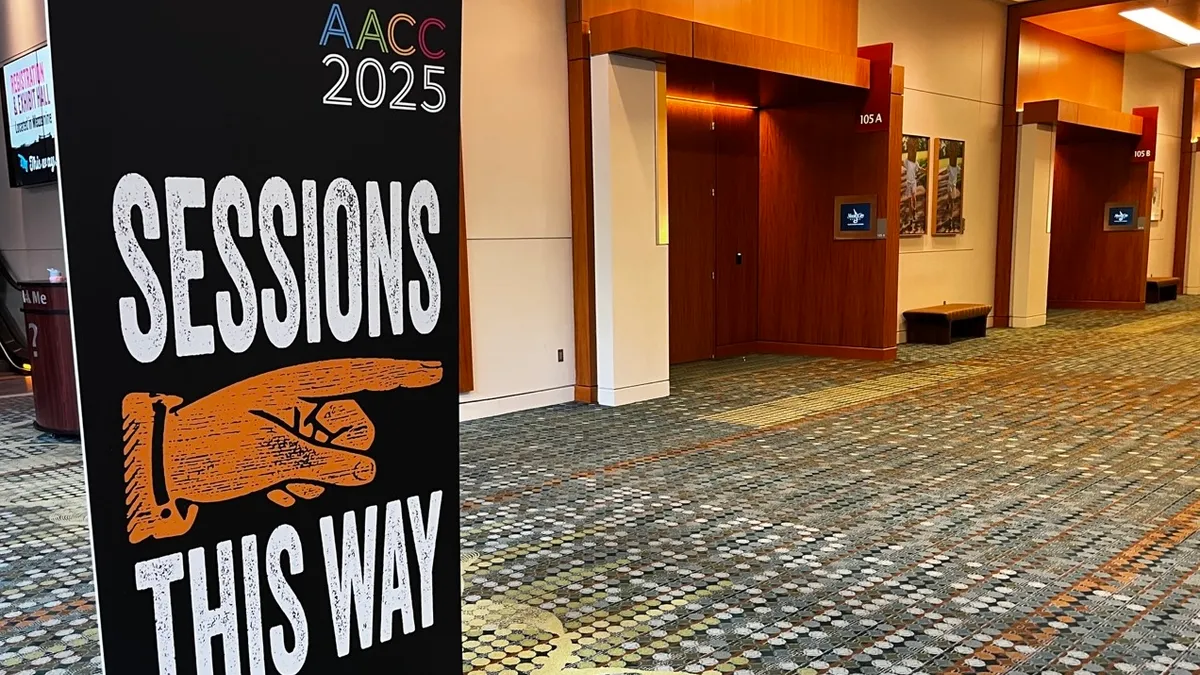Students at Ohio State University will soon be able to turn their love of video games into a career. This fall, the state flagship university plans to launch a bachelor of science degree in esports.
Esports are live video game competitions, held either online or in venues with an audience where the competition is also broadcast to online channels. Popular titles include League of Legends and Fortnite, and the games are played by amateurs and professionals alike.
It's a growing industry, in which money is made from activities such as streaming, franchising and sponsorships. Global esports revenues are expected to hit $1.1 billion this year, up 27% from last year, according to market research firm Newzoo, which provides gaming and esports analytics. North America is its largest market, accounting for more than a third of all revenue.
As esports expands, more colleges and universities are going beyond supporting varsity and club teams to teaching their students how to work in the field. Through individual courses, certificates and full degrees, they are focusing on aspects such as business management, team development and marketing and broadcasting.
At Ohio State, students will be able to choose from three tracks: esports and game creation; esports management; and the application of games in medicine and health.
Deb Grzybowski, co-director of the esports major at Ohio State and an associate professor of practice in engineering education, said she receives many inquiries from high school and college students — and their parents — about the program.
"We're not teaching students how to play video games," she said. "That's how some parents think. It's the business of esports."
Esports programs expand
At Ohio State, 27 faculty members from five colleges spent about 13 months developing the interdisciplinary esports curriculum. But esports has been a topic of conversation for many years, said Grzybowski, who at one point was an adviser for a student esports organization at Ohio State.
The university is starting small with its new bachelor's degree. "There are many more areas we want to branch out into," Grzybowski said, such as offering esports certificates.
For the first two years, the university will limit each track to three dozen students, and existing faculty members will teach the classes.
The combination of interest from students and the burgeoning esports industry encouraged Ohio State to launch its program, Grzybowski said.
"There aren't a lot of people out there who have experience doing that," she said of working in the esports industry.
Ohio State isn't the only college bringing esports into its curriculum.
Massachusetts' Becker College began offering a bachelor of science degree in esports management last fall with about 15 participating students. This fall, the small private college will launch a second esports bachelor's degree, covering emerging media and content management.
Although the college could easily recruit students for the programs, it decided to use traditional enrollment tactics instead, said Alan Ritacco, dean of Becker's School of Design and Technology.
"We prefer to restrain ourselves and create a program that's sustainable and pedagogically sound," he said.
All of Becker's esports classes — which are connected to the college's business department and use project-based learning — are taught by industry leaders. And an industry advisory group is dedicated to the esports program.
Becker is also building a pipeline. This summer, it's offering a free program intended to give high school students, particularly those from underserved backgrounds, a taste of esports management.
"We're not teaching students how to play video games. That's how some parents think. It's the business of esports."

Deb Grzybowski
Co-director of Ohio State's esports major
Students at the University of Nevada, Las Vegas can take an advanced elective course on the business of esports, specifically as it relates to the area's casino resort industry, said Robert Rippee, director of UNLV's hospitality and esports labs.
About 40 students have taken the class, which launched nearly four years ago. They hail from a variety of majors, including architecture, business, engineering and the social sciences.
Rippee said he anticipates expanding the esports curriculum within the next few years.
The addition of a 43,000-square-foot gaming and hospitality lab at the university created in partnership with Caesars Entertainment will help. There, students will participate in hands-on learning via an esports arena, as well as mock hotel rooms, casinos and virtual reality facilities.
Although business management is a popular angle through which colleges are approaching esports, it's not the only one. Syracuse University last year launched a class called Esports and Media, in which students cover topics such as the history of esports, live broadcasting of matches and development of advertising plans. It was developed with Twitch, an esports streaming platform.
"It really gave us an opportunity to dive into esports as an industry, not just as a niche within," said Olivia Stomski, director of the Newhouse Sports Media Center at Syracuse, who co-taught the class.
Capped at 20 students for the first class, this fall it will expand to 35 — although there's already a waiting list. Based on that popularity, Syracuse is considering further expansion, possibly to a minor or major, said fellow instructor Chris Hanson, an associate English professor who has worked in the gaming industry.
Addressing a skills gap
As the esports industry expands, people with related knowledge are in demand. That's where colleges come in.
Kevin Mitchell, director of business development and strategic intelligence at entertainment firm National Amusements, said he came across "amazing opportunities" for the company in esports but noted there was a lack of a skilled workforce.
Colleges looking to develop esports curriculum stand to benefit from engaging administrators and the industry. "The biggest obstacle is awareness that it's a viable activity," said Mitchell, who is also an adjunct professor for Emerson College's esports classes.
Becker's Ritacco agrees. He cautions schools that it could be problematic if their presidents don't have a firm commitment to or understanding of esports and its value.
Developing programs with such stakeholders in mind can help.
At Ohio State, Grzybowski recommends starting with the questions: "What do you want your end student to look like? When they graduate from the program, what's their skill set?"
UNLV's Rippee advises aligning the esports curriculum with a school's existing strengths. For example, an institution that already offers a robust game development curriculum could focus on that element of esports.
It's also important to take a multidisciplinary approach that will attract students from a variety of academic programs.
"It's not just hospitality. It's not just gaming. It's not just architecture," he said. "It's for any of those students."






















